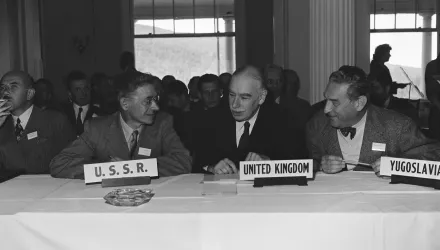International Security is America's leading peer-reviewed journal of security affairs.
This policy brief is based on "Don't Come Home, America: The Case against Retrenchment," which appears in the winter 2012/13 issue of International Security.
Bottom Lines
- The United States' Current Grand Strategy of "Deep Engagement" Remains Optimal. Retrenchment from U.S. security commitments to partners in Europe, East Asia, and the Middle East would put major security and economic benefits at risk.
- The United States Can Sustain the Budgetary Cost of Deep Engagement. The strategy can be maintained at far lower funding levels than the post-2001 norm. In addition, there is no systematic evidence that defense commitments of this magnitude adversely affect economic performance, or that savings yielded by even the most dramatic retrenchment would improve U.S. growth or productivity.
- Retrenchment Would Reduce U.S. Security. Deep engagement helps to prevent the emergence of dangerous security dynamics in the world's core regions.
- Retrenchment Would Reduce U.S. Prosperity. Deep engagement facilitates the U.S. effort to maintain the stability of economic globalization and ensures that its overall architecture is favorable to U.S. interests.
- Retrenchment Would Reduce Needed Global Cooperation. Deep engagement helps promote institutionalized cooperation that generates benefits for many states but often disproportionately reflects U.S. preferences.
Deep Engagement: An Optimal Grand Strategy
The United States has pursued a grand strategy of "deep engagement" since the end of World War II. At the core of this grand strategy is a series of security commitments to partners in Europe, East Asia, and the Middle East. Growing fiscal pressures, the difficulties associated with the interventions in Iraq and Afghanistan, and the rise of China have added fuel to the argument championed by most international relations scholars who write on U.S. grand strategy: that America should pursue retrenchment by curtailing or eliminating its overseas military presence and eliminating or dramatically reducing its global security commitments. A comprehensive assessment of the strategy's costs and benefits reveals that these scholars are wrong: America's choice to retain a grand strategy of deep engagement after the Cold War is just what the preponderance of international relations scholarship would expect a rational, self-interested, leading power in the United States' position to do.
The Affordability of Deep Engagement
Post–September 11 levels of defense spending are unnecessary to maintain the deep engagement strategy. After the September 11 terrorist attacks, defense spending increased dramatically, owing in large part to the wars in Iraq and Afghanistan as well as to an augmented effort to wield and to use military tools in the wider war on terrorism. Both of these drivers of increased spending during the past decade have already begun to be reversed as the United States winds down the two costly wars and begins to trim nonwar "base" spending. The United States currently spends 4.5 percent of its gross domestic product (GDP) on defense, but this figure is slated to drop by 50 percent within a few years: based on current Defense Department planning, defense cuts are expected to bring defense expenditures as a share of GDP just below 3 percent by 2017, even though spending in real terms will be roughly $100 billion higher than it was in the late 1990s. Importantly, this does not represent the floor for spending to sustain the strategy over the long term: the Pentagon could save more with no ill effects by reforming its procurement practices and compensation policies.
It is therefore clear that the United States can sustain the budgetary cost of deep engagement. Spending roughly 3 percent of GDP on defense is less than half the Cold War average (from 1950 to 1990, that figure averaged 7.6 percent). In the contemporary era, this represents a spending level comparable both to the world average of 2.5 percent and to that of U.S. allies such as Britain (2.5 percent) and South Korea (2.7 percent), while only marginally above China (2.0 percent). A meta-analysis of economic studies of the relationship between military spending and economic performance confirms that there is no reason to expect adverse effects on U.S. growth from this spending. There is thus no economic-growth rational for retrenchment.
Retrenchment and the Reduction of U.S. Security
Revoking security guarantees would make the world and the United States less secure. In Asia, Japan and South Korea would likely expand their military capabilities if the United States were to leave, which could provoke a dangerous reaction from China. Security dilemmas in the Middle East would likely become more intense absent a U.S. presence. In addition, there are dangers even in Europe, which may become more unstable if current U.S. allies do not develop the capabilities to deal with security problems on their periphery following a U.S. withdrawal.
A U.S. withdrawal, moreover, could spark a cascade of nuclear proliferation if states such as Egypt, Japan, South Korea, Taiwan, and Saudi Arabia were to build nuclear forces. This could prompt other states in each region to seek nuclear arsenals as well. A dramatic increase in the number of nuclear powers would be a great concern, because most of these states would not have the kinds of nuclear forces that are needed to generate stable nuclear deterrence such as existed between the United States and the Soviet Union during the Cold War. And the more nuclear powers there are, the higher the probability of "leakage" to nonstate actors.
Retrenchment would vitiate the leverage that Washington now uses to restrain its partners from acting provocatively and from transferring weapons to potential adversaries, which in turn helps to deter other states in each region from undertaking destabilizing actions. Ultimately, by decreasing global security, retrenchment would likely generate greater military efforts worldwide, prompting a more rapid diffusion of power away from the United States. Far from the solution its proponents advertise, retrenchment would likely exacerbate the problem of American decline.
Retrenchment and the Decline of U.S. Prosperity
Proponents of retrenchment downplay the key economic benefits associated with the current grand strategy. The United States benefits greatly from the continued expansion of global commerce, which would be put at risk if destabilizing rivalries or conflicts were to emerge in regions of key economic significance. By reassuring allies and managing security relations, the current grand strategy helps to prevent this from happening. Moreover, U.S. military commitments help to ensure the openness of sea-lanes and other shipping corridors, which undergirds the historically low transportation costs that help keep the global economy humming.
As the country most responsible for the current structure of economic globalization and the institutions associated with it, much of what the United States wants from the economic order is simply "more of the same"—it prefers the structure of the main international economic institutions such as the World Trade Organization and the International Monetary Fund; it prefers the existence of "open regionalism"; it prefers the dollar as the reserve currency; and so on. U.S. interests are thus well served to the extent that American allies favor the global economic status quo as well, rather than revisions that could be harmful to U.S. economic interests. Indeed, one reason they are often inclined to take this approach is their security relationship with the United States. Retrenchment would thus weaken or destroy the security ties the United States has historically used to help shape the global economy in favorable ways.
The United States' security leverage over its allies matters even if it is not used actively. This is perhaps best illustrated by the status of the dollar as the reserve currency, which confers major benefits on the United States. The U.S. position as the leading superpower with worldwide security commitments is an important reason why the dollar was established as the reserve currency and why it is likely to retain this status for a long time. In the past, Washington frequently used direct security leverage to get its allies to support the dollar, but there are also a number of subtler mechanisms through which the current U.S. geopolitical position serves the same end.
In sum, the United States is a key pillar of the global economy, but it does not provide this service for free: it also extracts disproportionate benefits. Undertaking retrenchment would place these benefits at risk.
Retrenchment and the Decline of Needed Global Cooperation
What goes for the global economy also applies to larger patterns of institutionalized cooperation. Here, too, the leadership enabled by the United States' grand strategy fosters cooperation that generates diffuse benefits for many states, but often disproportionately reflects U.S. preferences. To counter transnational threats such as terrorism and climate change, states have to work together. But although cooperation is often necessary and desired, it can frequently be hard to achieve. The United States' current grand strategy makes it easier for Washington to bring about joint action and to shape it in ways that reflect U.S. interests.
The United States' extended system of security commitments creates a set of institutional relationships that foster political communication. Alliance institutions are first about security protection, but they also bind states together and create institutional channels of communication. For example, NATO has facilitated ties and associated institutions that increase the ability of the United States and Europe to talk to each other and to do business. Likewise, the bilateral alliances in East Asia also play a communication role beyond narrow security issues. Consultations and exchanges spill over into other policy areas. This gives the United States the capacity to work across issue areas, using assets and bargaining chips in one area to make progress in another.
By severing the security ties that are at the center of key relationships and stripping Washington of the levers it uses to forge interstate deals on favorable terms, retrenchment would likely mean less—and less favorable—cooperation on crucial matters that can only be addressed multilaterally.
Stephen G. Brooks is Associate Professor of Government at Dartmouth College.
G. John Ikenberry is the Albert G. Milbank Professor of Politics and International Affairs at Princeton University in the Department of Politics and the Woodrow Wilson School of Public and International Affairs. He is also a Global Eminence Scholar at Kyung Hee University.
William C. Wohlforth is the Daniel Webster Professor in the Department of Government at Dartmouth College.
International Security is America’s leading peer-reviewed journal of security affairs. It provides sophisticated analyses of contemporary, theoretical, and historical security issues.
International Security is edited at Harvard Kennedy School’s Belfer Center for Science and International Affairs and is published by The MIT Press.
For more information about this publication, please contact the International Security publications coordinator at 617-495-1914.
Statements and views expressed in this policy brief are solely those of the authors and do not imply endorsement by Harvard University, the Harvard Kennedy School, or the Belfer Center for Science and International Affairs.
Brooks, Stephen G., G. John Ikenberry and William Wohlforth. “Why America Should Not Retrench.” March 2013





